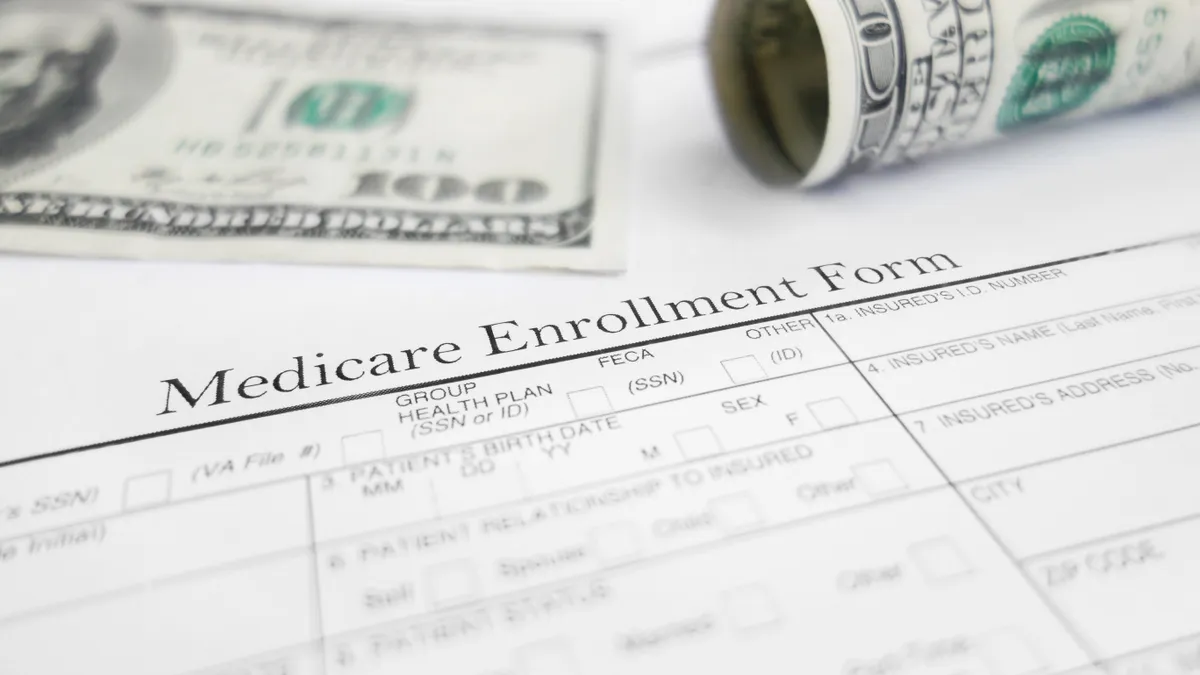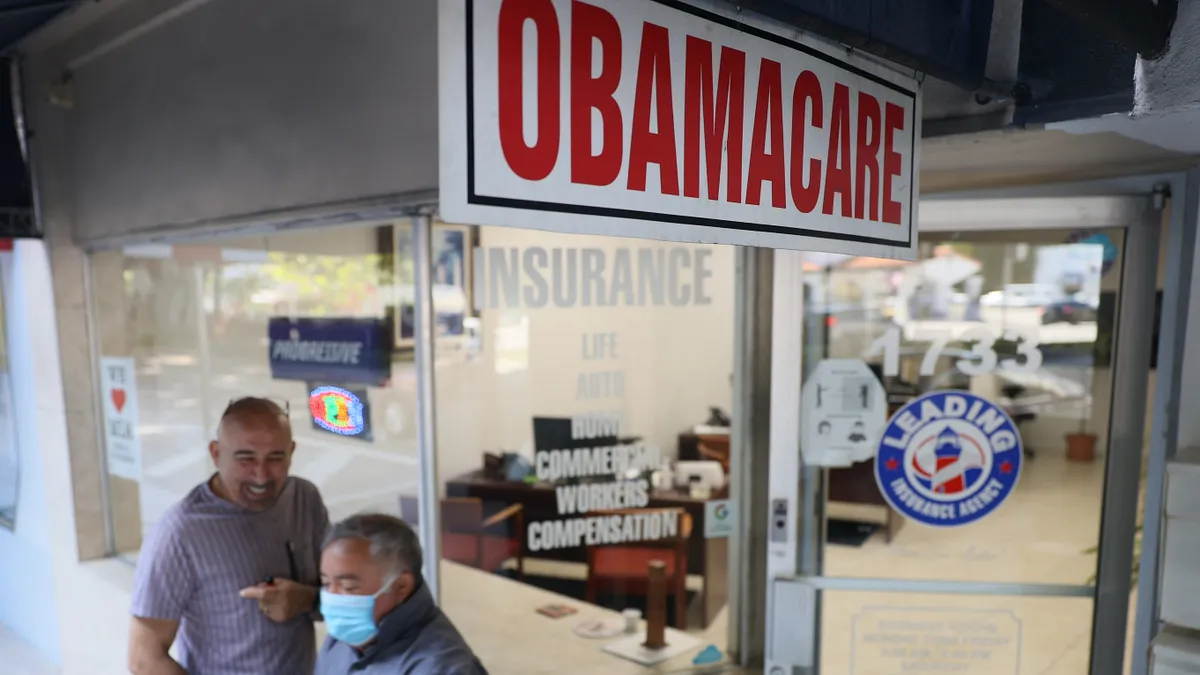Major insurers are gaming Medicare Advantage’s risk adjustment system to reap higher payments from the government, costing Medicare billions of dollars, according to a new analysis of CMS data.
UnitedHealthcare, the biggest MA insurer in the U.S., collected up to $785 more per beneficiary than local nonprofit plans in 2023, costing Medicare more than $6 billion in excess payments that year, according to the research released Wednesday from the Alliance of Community Health Plans, a group that represents local and regional nonprofit payers.
Similarly, Humana, the second-biggest MA payer, collected $423 more per beneficiary that year than if those members were in ACHP member plans, costing Medicare an additional $4 billion, according to the group.
The ACHP’s findings are concerning given a growing body of evidence raising red flags about upcoding, especially given how the additional payments mostly accrue to plans in the form of higher profits. They also come amid rising momentum on Capitol Hill to crack down on bad behavior in the privatized Medicare program, a goal also supported by some regulators in the Trump administration.
The ACHP pointed to the data in stumping for a complete overhaul of risk adjustment, to make it simpler and reduce opportunities for gaming.
The ACHP has presented its plan to the CMS, and regulators appeared open to the changes, Ceci Connolly, the association’s CEO, said during a press briefing on Wednesday.
“Medicare Advantage risk adjustment is broken. Full stop,” Connolly said. “Over the past 20 years, it has just been turned into a system that can be abused literally thousands of different ways.”
‘Significant gaming’
In Medicare Advantage, the government pays health insurers a per-member, per-month fee for covering the care of Medicare seniors. That fee is adjusted based on how sick a specific member is — a policy meant to prevent adverse selection and ensure that insurers covering sicker members are adequately compensated.
But risk adjustment has spiraled out of control, giving powerful corporate payers numerous opportunities to aggressively code their patients to hike government reimbursement, research suggests. Strategies include sending nurses to visit members at home and look for evidence of more diagnoses, whether or not those members receive treatment for that condition.
In 2023, UnitedHealthcare’s average risk scores were 36.2% higher and Humana’s were 19.2% higher than nonprofit health plan members of ACHP, according to the group’s analysis.
When confronted with such data, insurers generally argue that higher risk scores represent sicker members. Lobbies for the MA industry, particularly the Better Medicare Alliance, have also criticized studies finding disparities in coding practices as skewed.
But the obvious delta can only be the result of unnecessary coding, given all plans have a mix of healthy and unhealthy members, according to Michael Bagel, the ACHP’s vice president of policy.
“UnitedHealthcare as the largest insurer is saying that their consumers on average are 36% sicker than regional health plans’ members are. And Humana’s are 19% sicker,” Bagel said. “It is implausible if not impossible for this to be the case, except for the fact that there is significant gaming.”
Numerous recent studies and investigations from health policy researchers, government watchdogs and journalists have yielded evidence of upcoding from large insurers.
UnitedHealthcare, for example, generated $14 billion in MA overpayments through upcoding in 2021 — by far the largest amount of any payer in the privatized Medicare program, according to a study published earlier this year.
Overall, MA plans are expected to see a payment increase of 10% this year compared to traditional Medicare due to upcoding, according to congressional advisory group MedPAC. Over the next decade, upcoding could lead to Medicare overpaying MA plans by $600 billion, per a Committee for a Responsible Federal Budget analysis of MedPAC’s findings.
Some major insurers support reforms to risk adjustment, like reducing the impact of health risk assessments on patients’ scores. But policies currently on the table don’t go far enough, according to the ACHP.
Instead, the group is pushing for a completely new system of accounting for members’ health needs. Instead of allowing plans to adjust risk based on 115 condition categories and thousands of diagnoses, risk adjustment should solely be based on patient demographics, such as age, sex and disability status, and on a small list of substantiated health conditions like autoimmune diseases, cancer or congestive heart failure, the ACHP said.
The ACHP has had conversations with regulators over the past eight months about addressing risk adjustment — including presenting the data and policy recommendations last week — and gotten an encouraging reaction, according to the group.
Regulators told the ACHP that they intend to take steps with respect to risk adjustment, though they didn't commit to any specifics, according to Connolly.
“It did not surprise us that there was a difference in how the largest insurers are leveraging risk adjustment,” Bagel said. “The magnitude that they were leveraging it and the dollars that flowed from their leveraging of it, their gaming the system, surprised us who have been in this field for a long, long time. And I would say even surprised those at CMS.”
The ACHP hasn’t run the numbers on how much its proposed reforms would save the government. Much would depend on how the CMS implements the plan (if at all). But between 2023 and 2033, MA payments are projected to reach nearly $8 trillion — $2 trillion higher than spending in traditional Medicare, according to health policy research group the KFF.
Given evidence that upcoding is driving MA spending, “if you’re imagining that we can even shave 1% off risk adjustment, 2% off risk adjustment, that’s being gamed today, you can imagine significant, significant savings,” Bagel said.
“We need to fix this so that consumers have choice and taxpayers can save money and providers can focus on what matters, which is care, not the codes,” he added.
Republicans control both bodies of Congress and the White House. And traditionally, Republicans broadly support MA, which was created on the premise that private insurers could help the government manage Medicare more economically and has grown to cover more than half of all Medicare seniors.
But amid a larger push to reduce waste, fraud and abuse, top health regulators in the Trump administration have pledged to scrutinize profiteering in MA. This spring, the CMS announced it planned to ramp up MA overpayment audits.
Members of Congress have also zeroed in on reforming risk adjustment to curb overpayments, though such policies were left out of the GOP’s massive tax and policy megabill passed in July.
Still, a bill introduced with bipartisan backing this year would crack down on upcoding by tweaking the risk adjustment model, including by making it harder for plans to include old or unsupported medical conditions in their members’ risk scores.





















